Hundreds of abandoned boats dumped around Devon and Cornwall
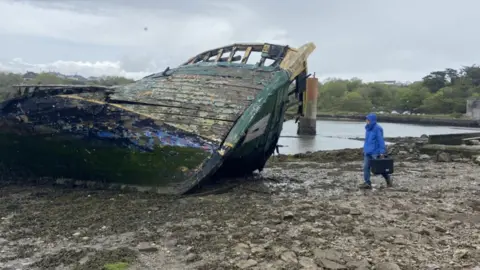 BBC
BBCIt's been called the fly-tipping of the maritime world. Hundreds of plastic boats are dumped on foreshores and tidal creeks around Devon and Cornwall. The problem is costing authorities thousands of pounds, harming the environment and can be seen from space but dealing with it has, in some cases, become "torturous".
Sinking into the mud of Hooe Lake the 65ft (20m) former fishing boat, 'Dignity', sheds her toxic paint into the sediment.
She is just one of hundreds of boats to lie abandoned on the shores and tidal creeks of Devon and Cornwall posing a risk to the environment.
Hooe Lake in Plymouth is one of the places which has become a graveyard for the giant pieces of waste.
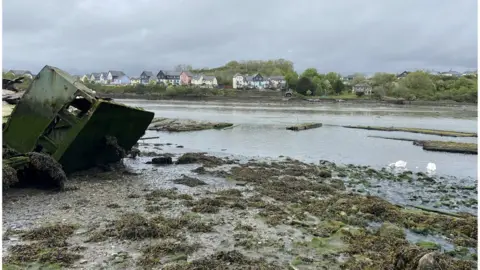
Dr Andrew Turner, a marine scientist from the University of Plymouth, said: "It's like a form of fly-tipping, you have one abandoned boat and other people think well, this is a good place to put my boat and before you know it you've got several boats there.
"Some of them have asbestos on them, oils, batteries and aside from that there's the aesthetic impact.
"It's something that needs looking at seriously," he said.
In a report for the European Commission, it is said that up to 130,000 recreational boats reach the end of their life across Europe every year.
"You go to any creek or estuary in the South West and you will see abandoned boats," Dr Turner said.
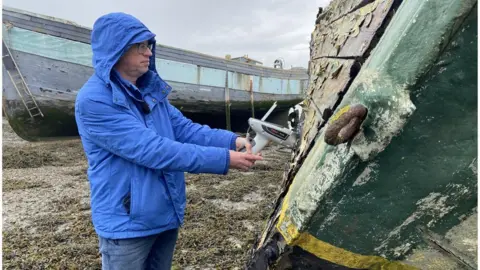
The Dignity was shedding Tributyltin - a potent anti-fouling paint that was later banned due to its toxicity.
"One of the key things it was doing was causing molluscs to change sex in the marine environment on exposure to extremely small concentrations," explained Dr Turner.
"It was later found to be toxic to pretty much anything."
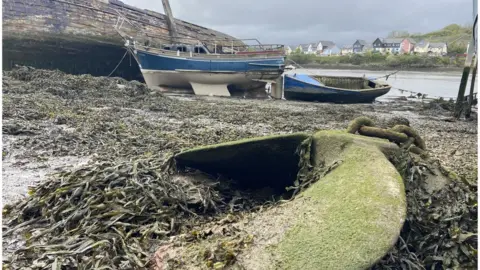
Many of the abandoned vessels are made with glass reinforced plastic (GRP), also known as fibreglass, a notoriously difficult composite to break down, and most will end up in landfill.
The region is expected to see a huge rise in the numbers abandoned over the coming years.
Dr Turner said it was difficult to know how many abandoned boats there were as there was no registration system but the problem appeared to be growing.
He said: "We've had a student looking at Google Earth and we believe there are a few hundred around the South West but there might be more that you can't see.
"We started investigating this six or seven years ago and we haven't seen much improvement since then."
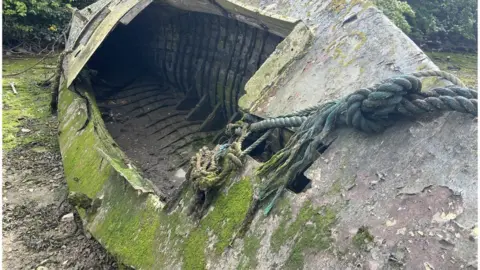
Responsibility for the boats, once abandoned, falls on the landowner, or in most cases, the relevant harbour authority.
In Restronguet Creek near Truro in Cornwall there is no harbour authority which means when boats are abandoned, it is often on private land where it is left to the individuals or parish council to deal with.
Jan Pentreath, of the Restronguet Creek Society, a group made up of volunteers which looks after the area, said owners often stripped the boats of any identifying features before dumping them.
"We have seen people bring boats here, drop an anchor and go," he said.
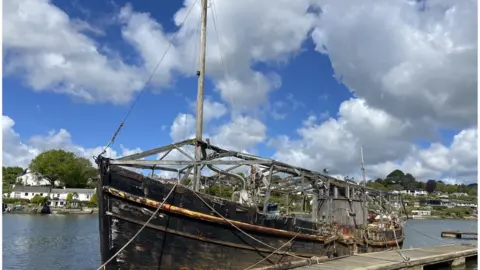
"The reason they do this is it's quite expensive to get rid of them.
"How do you get rid of an eyesore? To get rid you have to advertise it, then the legal situation is quite torturous and of course it is quite expensive," Mr Pentreath added.
"In which case the damn thing just sits there and then they often break adrift."
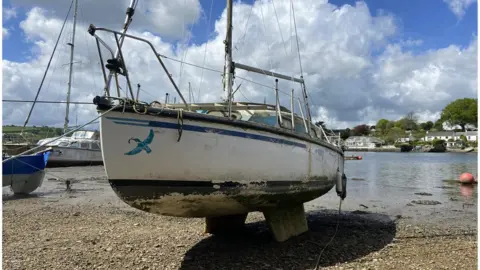
Further up the creek at Penpol, one abandoned sailing boat did just that.
"It was just drifting around so I collected it to stop it causing a problem," explained landowner, Ashley Butler.
"I did it for community spirit and all that but now I'm the one who has to pay to dispose of it."
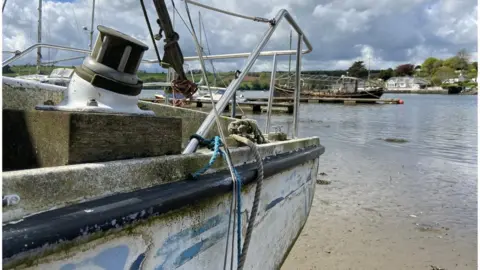
There is no official registration system for boats unlike with cars where it is easier to trace an owner.
Phil Horton, of the Royal Yachting Association, said: "There was a vast increase in the manufacturing of boats in the 1960s and 1970s and those will start coming to the end of life soon so now is the time to start looking at solutions before we start getting significant numbers.
"The real problem with end of life boats is that the person that last owns the boat is the person least likely to be able to afford to dispose of the boat properly."
He said the association was working with the British Ports Association to find out "how widespread the problem really is".

GRP boats can be found for sale online for as little as £1.
In some cases boats are slipped from moorings or dumped on harbour authority boundaries at night where dealing with the unserviceable hulks can cost thousands of pounds a time.
One harbour group, which asked not to be named for fear of reprisals, told the BBC its committee members had been "individually threatened" by one boat owner who refused to pay his mooring bill.
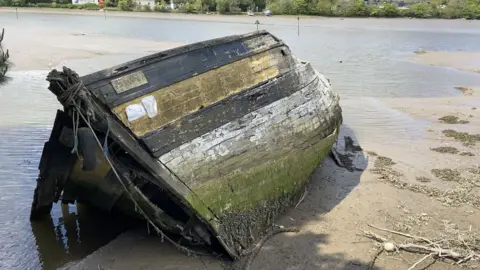
Attempts to dispose of the now infamous Durandal - abandoned in the Truro river - were thwarted by poor access.
Truro Harbour Authority said the eventual disposal could cost about £50,000.
In Penzance disposing of an old fishing boat is set to cost the harbour authority £75,000.
Smaller vessels cost between £1,000-2,000 to get rid of.
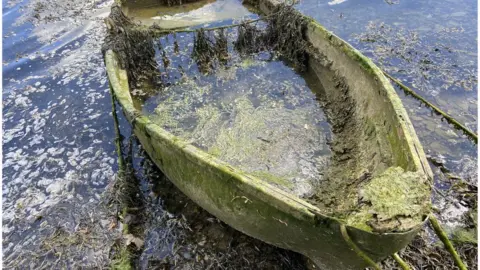
Truro Harbour Master, Mark Killingback, has dealt with around 20 abandoned boats in the past eight years but said the process was long-winded and fraught with legal challenges.
He said: "In Truro we have to establish there is no legal owner, that they are formally abandoned.
"Potentially a harbour master could be taken to civil court for damaging someone's property so once we've established there is no owner we have to go through a process of appropriate disposal."
Mr Killingback said even though the harbour was owned by Cornwall Council, the revenues of the port paid for any work carried out to protect navigation.
He said this meant it was ultimately other boat owners footing the bill for the abandoned vessels.

Follow BBC News South West on Twitter, Facebook and Instagram. Send your story ideas to [email protected].
